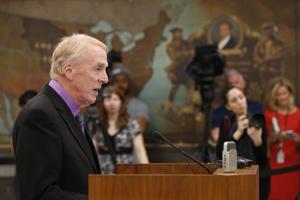Virginia Senate bill backs partial tax relief for businesses who took PPP loans, at odds with Northam, House

(The Center Square) – A Virginia Senate committee has proposed giving businesses partial tax deductibility for money received through federal Paycheck Protection Program (PPP) loans, which puts them at odds with Gov. Ralph Northam and the House of Delegates.
In December, the federal government approved legislation to allow businesses to deduct the PPP loans from federal income taxes. These forgivable loans were provided to keep workers employed during the COVID-19 pandemic. Because Virginia does not automatically conform its tax code to the federal code, businesses will not see a similar deductibility option on state income taxes unless lawmakers grant it.
Although full tax conformity is usually a routine matter, the commonwealth’s funding challenges have led lawmakers to propose only a partial conformity to the tax code. The House’s tax code conformity bill, which has yet to receive a floor vote, does not allow businesses to deduct any PPP loan spending from their taxes, which is in line with requests from the Northam administration.
On Wednesday, the Senate Finance and Appropriations Committee went a different route than the administration by advancing a substitute bill that would grant tax deductibility for up to $50,000 worth of PPP loan spending. The committee unanimously incorporated Senate Bill 1394, which provides the deductibility, into the administration’s proposal in Senate Bill 1146.
The legislation would only affect loans received in 2020, but would save the state’s businesses more than $70 million. It would also allow deductibility of the same amount for state-level grants received through the Rebuild Virginia fund. If the state were to include deductibility for 2021 loans, lawmakers would have to approve a similar measure when conforming the tax code for the 2021 fiscal year.
Sen. George Barker, D-Alexandria, who sponsored the legislation to provide the partial exemption, said he and other lawmakers drafted the bill to do what they could to help struggling businesses. He said full conformity would be ideal, but unlike the federal government, the state has more constraints and cannot simply print money to offset costs. The partial deductibility, he said, would help businesses come out of the pandemic still intact.
Although Republicans voted to incorporate the partial deductibility, many argued in the committee that the state should incorporate legislation that would allow businesses to deduct all of their PPP loans from their taxes, in conformity with the federal government. Republican leaders voted against the committee’s ultimate tax conformity bill.
Senate Minority Leader Tommy Norment, R-Hanover, told committee members that the $50,000 cap was unacceptable, which led him to cast a “no” vote. Sen. Steve Newman, R-Forest, also cast a “no” vote, but said he hopes to continue the conversation and get full deductibility in the legislation before it receives a vote on the Senate floor. He said he ultimately wants to support the bill if that can get done.
Committee Chairwoman Janet Howell, D-Reston, voted in favor of the committee’s version, but said she will continue dialogue with Republicans as the process moves forward.
Disclaimer: This content is distributed by The Center Square

